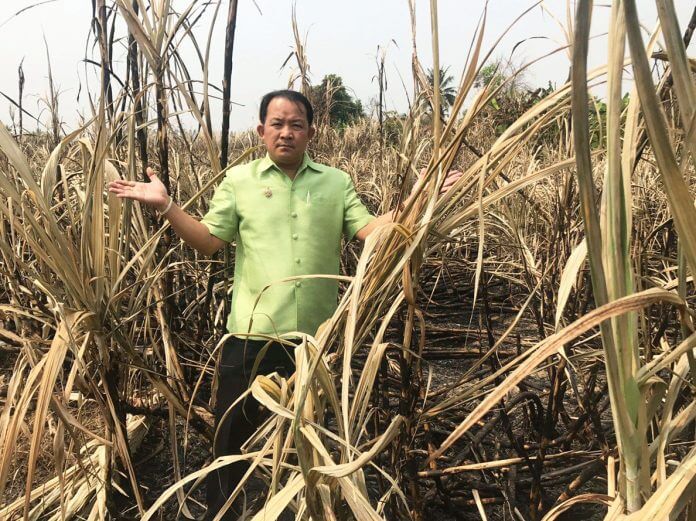Fields of burned-out sugarcane husks wrapped in flames are one of the major sources of smog, environmental activists say.
Looking over fields of burnt sugarcane Monday in Isaan, gadfly petitioner Srisuwan Janya said the junta must do more to stop farmers’ practice of burning sugarcane for easy transport.

“So many farmers are burning sugarcane here today,” Srisuwan said. “It’s more convenient for them to transport, and saves money. Farmers don’t care about smog.”
Srisuwan said he’s also received reports of smog as far north as Kamphaeng Phet, and has officially complained to the Ministry of Industry to demand they ban factories from purchasing burnt sugarcane.

“Many point to auto emissions as the source of smog, construction and burning trash…but fixing this smog problem is misguided. Smog doesn’t just occur in Bangkok and the surrounding areas,” Srisuwan said.
Greenpeace Thailand country director Tara Buakamsri said in a Monday interview that smoke from burnt sugarcane in Kanchanaburi and provinces west of the capital would be swept westward to Phetchaburi and Myanmar by seasonal monsoon winds, but not Bangkok.
However, burning crops east of Bangkok will contribute to the capital’s smog – one factor is haze pollution in Cambodia from crop burning being swept to Thailand. Tara says northern Cambodia is burning crops, clearing forests and burning single-crop farm fields during this season.
“Open-field burning, especially of agricultural waste, is a source of dust. It creates different sizes of dust, including PM2.5,” Tara said.
Srisuwan added that smog containing PM2.5 particles – the smallest and most harmful – is plentiful even in the rural central, eastern and western provinces, where sugarcane crops are grown.
The Ministry of Industry’s Office of Cane and Sugar Board officially designated the beginning of sugarcane pressing season Dec. 1 until the end of February. During this season, agros practice residue crop burning to quickly and easily transport sugarcane.
Srisuwan said the board as well as local farmer associations have not denounced the “sloppy and haphazard” practice by banning sales of burnt sugarcane stalks.
“If factories refuse to buy it, them the farmers will be to afraid to burn it,” he said.
Srisuwan Janya is a prominent activist known for filing complaints against governmental injustices and is also the founder of the Stop Global Warming Association.








